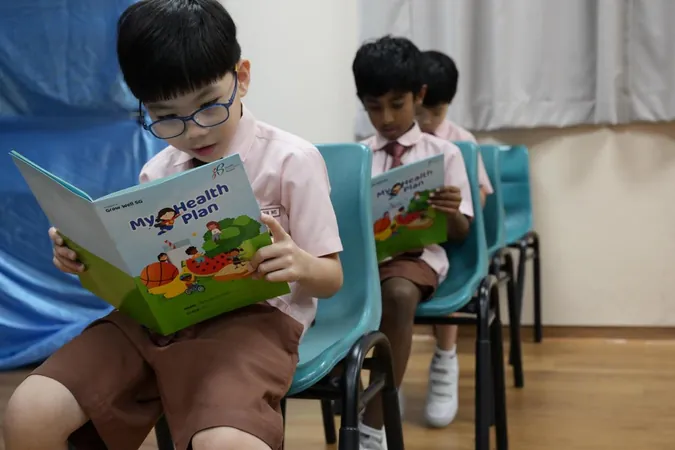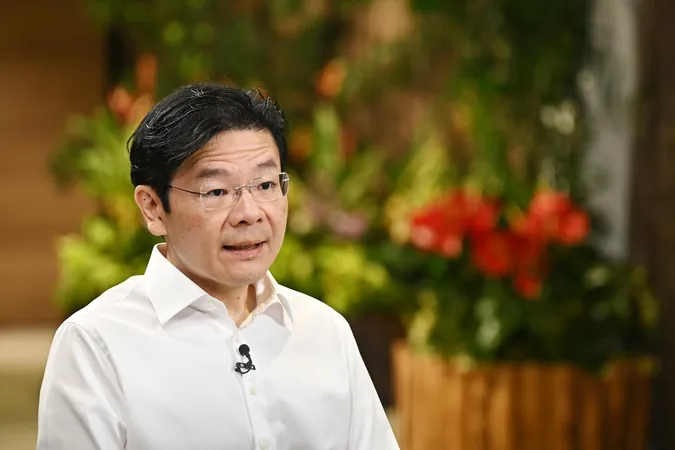
Singapore Takes Bold Steps to Combat Screen Time Among Children: New Guidelines Unveiled!
2025-01-22
Author: Wei
Singapore Takes Bold Steps to Combat Screen Time Among Children: New Guidelines Unveiled!
In a ground-breaking move to promote healthier habits, Singapore has introduced stricter guidelines regarding screen usage for children. As of January 21, the Ministry of Health (MOH) has decreed that children under the age of 18 months should have no screen exposure whatsoever, even from background devices like televisions.
These new directives are part of a national health initiative aimed at combating the growing issue of sedentary lifestyles among Singapore’s youth. With screen time linked to obesity and developmental challenges, the updated guidelines focus on children up to 12 years old and recommend limiting screen time for those aged three to six to less than one hour a day, and two hours for kids aged seven to 12.
Health Minister Ong Ye Kung emphasized at a recent press conference that research shows a direct correlation between excessive screen use and negative cognitive development in young kids. "We need to take decisive action; the habits formed during childhood can have lasting impacts on their physical activity, social interactions, and emotional health," he stated.
The new initiative, dubbed “Grow Well SG,” aims to create a coordinated effort among families, schools, and healthcare sectors to foster healthier lifestyles. The updated guidelines will require all pre-schools to adhere to a strict Code of Practice by February, ensuring that screen time is limited to educational purposes for children aged 18 months to six years.
In tandem, primary and secondary schools will receive more detailed regulations on managing the use of smartphones and smartwatches. Students in these institutions will be expected to store their mobile devices before class and use them only at designated times, ensuring that learning remains the priority during school hours.
Globally, other nations are also taking strides against excessive screen time. Notably, Brazil’s recent law restrictions on smartphone use in schools and Australia’s ban on social media access for children under 16 indicate an international trend towards safeguarding children's mental and physical well-being.
Emerging studies in Singapore are revealing concerning patterns, with a notable 46.4% of individuals aged 15 to 21 exhibiting problematic smartphone use. Experts warn that excessive screen interactions can stunt language development and erode attention spans in younger children.
To reinforce these guidelines, parents play a crucial role and must lead by example in managing screen time. Aligning with this ethos, teacher Ms. Cheryl Chang from M.Y World Preschool highlights that their approach incorporates "meaningful digital learning" without compromising essential human interaction.
Families are encouraged to engage with their children outside of screen time, with parents like Junior Ong adopting a strict policy of limiting their children's screen access to just one hour per week. “We want to bond; our priority is on interactions, not distractions,” he remarked.
As Singapore continues to adapt to the digital age, these sweeping measures represent a proactive approach to ensure the health and well-being of future generations, equipping them with the foundational skills needed to thrive in a balanced lifestyle. Will these changes shape a healthier future? Only time will tell!


 Brasil (PT)
Brasil (PT)
 Canada (EN)
Canada (EN)
 Chile (ES)
Chile (ES)
 Česko (CS)
Česko (CS)
 대한민국 (KO)
대한민국 (KO)
 España (ES)
España (ES)
 France (FR)
France (FR)
 Hong Kong (EN)
Hong Kong (EN)
 Italia (IT)
Italia (IT)
 日本 (JA)
日本 (JA)
 Magyarország (HU)
Magyarország (HU)
 Norge (NO)
Norge (NO)
 Polska (PL)
Polska (PL)
 Schweiz (DE)
Schweiz (DE)
 Singapore (EN)
Singapore (EN)
 Sverige (SV)
Sverige (SV)
 Suomi (FI)
Suomi (FI)
 Türkiye (TR)
Türkiye (TR)
 الإمارات العربية المتحدة (AR)
الإمارات العربية المتحدة (AR)